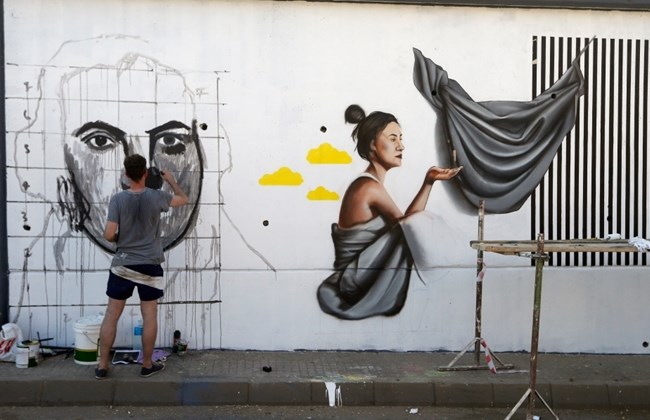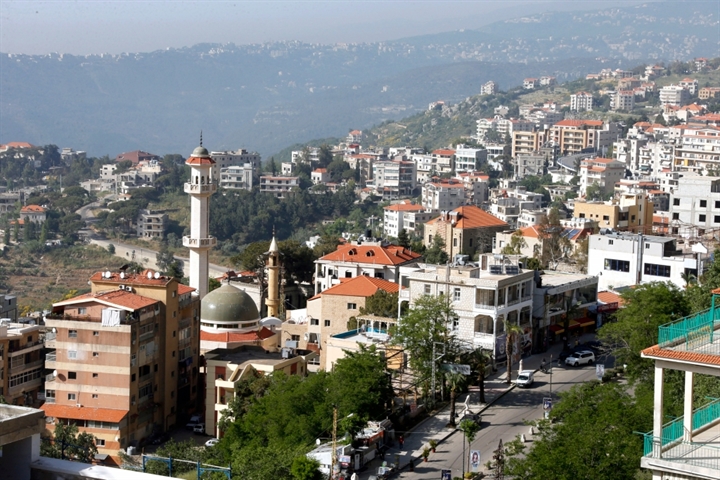ALEY, Lebanon: On a side street a short walk from the Aley town center, the parking lot of the Druze Women’s Association medical center Saturday morning was teeming with people lining up to receive free medical tests.
Many of Lebanon’s poorest communities cannot afford insurance or basic medical examinations.
They therefore rely on initiatives like the Lebanese American University’s third annual “National Health Day” for health care.
Medical students and professionals Saturday tested patients for blood glucose, cholesterol and iron levels, and carried out ECGs and general health examinations, all with immediate results and all for free.
They were joined by four specialists who held open clinics in Aley for dermatology, obstetrics and gynecology, dietetics and neurology.
LAU’s Medical Center set up clinics at five locations, in Aley, Baabda’s Kfar Shima, Western Bekaa’s Qaraoun, Sidon’s Bablieh as well as Jbeil’s Hsarat.
“Not everyone can afford the necessary screenings,” Sarah Aridy, the LAU medical student in charge of the Aley operation, said. “So we’re trying to provide as much help as possible.”
The cost of simple medical tests can be prohibitive at regular clinics, said Rania Abu Jaber from the Druze Women’s Association, which provides medical services to around 700 people every month.
“There is no fixed rate for the tests in Lebanon,” she added. “In this area [Aley], they could cost 50,000 or 70,000 [Lebanese pounds, $33 to $46] and if you go down to Beirut, doctors can charge up to $100.”
Ramzi Judri, who is on the Aley Municipality’s health council, said that even diabetes tests, which normally cost around LL5,000, are out of reach for many people.
Nabil Abdel-Haq is a quilter from Aley who came for blood glucose testing Saturday. “I had to come here because of my financial situation,” he told The Daily Star. “We have so many expenses: water, electricity, schools, food and other things. I just can’t afford medical insurance.”
The initiative doesn’t just help those in need, however, as medical students are getting valuable, real-world training by volunteering.
“This is the first time we have treated actual people,” Maher al-Shami, a first-year student at LAU’s Jbeil campus, said during a brief pause between patients.
The people who came to receive treatment were from all walks of life. Elderly couples, young families and migrant workers mingled at the Aley clinic, which proved to be Saturday’s most popular venue, with over 320 patients coming from Metn and Chouf, and as far as Sidon.
Elsewhere, Hsarat received 100 people; Kfar Shima around 50; Qaraoun, 85; and Bablieh, at least 200.
“The atmosphere is amazing here, but so crowded,” Aridy said as she dashed from one patient to another.
To spread the word, LAU sent letters to municipalities, which displayed posters in their towns.
Some people learned of the event by word of mouth. Aley resident Amira al-Banna said she’d received the event poster via WhatsApp. “My neighbor sent it to me,” she said, “but I have no idea who sent it to her!”
In line with the country’s demographics, the Palestinian community was more represented in the south, while Bekaa’s Qaraoun center welcomed Syrian nationals from nearby refugee camps, according to External Affairs Officer for the LAU Medical Students Association Christelle El-Helou. “Our clinics are open to everyone,” she said. “We’re not targeting a specific community.”
Lebanese citizens were by far the most represented at the Aley medical center, with the majority of patients coming from the town and surrounding villages.
Souad al-Banna, a widow from the Aley village of Sharoun, said she struggled to pay for medical care as she no longer had anyone supporting her financially.
“There’s a difficult economic situation in Lebanon, and it’s getting worse,” she said.
“But we say thank God that these kind doctors came to help us.”
(Daily Star)





